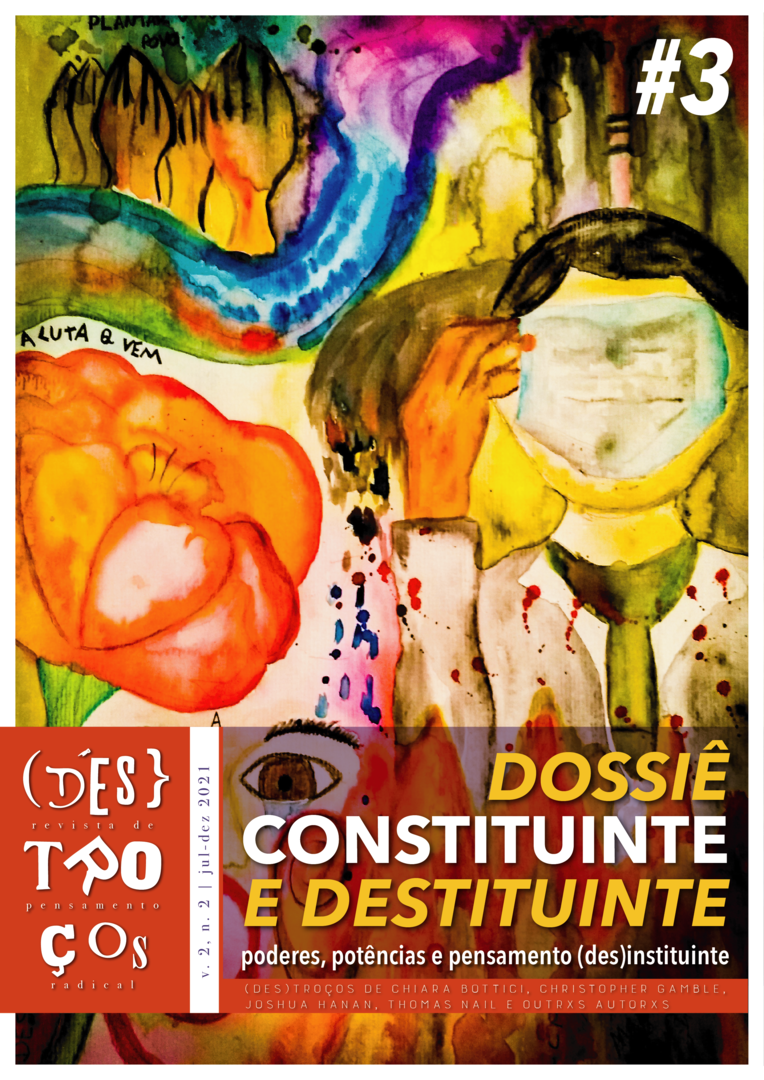Destituent: the concept formation between the practice of criticism and the criticism of practice
Published 2022-04-17
Keywords
- destituent,
- constituent power,
- new social movements
How to Cite
Copyright (c) 2022 (Des)troços: journal of radical thought

This work is licensed under a Creative Commons Attribution-NonCommercial 4.0 International License.
Abstract
This work seeks to explore the formation of the concept of “destituent” within political practice and philosophical criticism. Therefore, it identifies its emergence within the crisis of the concept of constituent power established in constitutional studies, in which it is treated as a mere question of principle of the legal order that, from a teleological perspective of history, is absorbed by the constituted power once consolidated the so-called democratic structures of the current rule of law. In this way, with the supposed intention of guaranteeing the permanence of fundamental rights and the stability of democratic institutions – especially after the totalitarian experiences that marked the last century – the inherent de-constituent dimension of the constituent power has been gradually silenced. However, this theoretical trend has faced serious challenges due to new social movements that have taken the streets in various parts of the world in recent decades, and it is precisely in this context that a new approach has taken shape, aiming to analyze this de-constituent dimension, and which we can gather under the label of “destituent thinking”.
Downloads
References
- AGAMBEN, Giorgio. A potência do pensamento. Trad. Carolina Pizzolo Torquato. Revista do Departamento de Psicologia, v. 18, n. 1, pp. 11-28, 2006.
- AGAMBEN, Giorgio. Ideia do poder. In: Ideia de prosa. Trad. João Barrento. Belo Horizonte: Autêntica, pp. 61-62, 1987.
- AGAMBEN, Giorgio. Notas sobre a política. In: Meios sem fim: notas sobre a política. Trad. Davi Pessoa. Belo Horizonte: Autêntica, pp. 53-56, 2015.
- AGAMBEN, Giorgio. O que é um dispositivo? In: O que é o contemporâneo e outros ensaios. Trad. Vinícius Nicastro Honesko. Chapecó: Argos, pp. 25-54, 2009.
- AGAMBEN, Giorgio. O reino e a glória. Trad. Selvino J. Assmann. São Paulo: Boitempo, 2011.
- AGAMBEN, Giorgio. O uso dos corpos: homo sacer, IV. 2. Trad. Slevino J. Assmann. São Paulo: Boitempo, 2017.
- AGAMBEN, Giorgio. Por uma teoria do poder destituinte. Disponível em: https://5dias.wordpress.com/2014/02/11/por-uma-teoria-do-poder-destituinte-de-giorgio-agamben/. Acesso em 2 set. 2020.
- AMATO, Pierandrea et. al. Editorial. Pouvoir destituant: les révoltes métropolitaines, n. 3, pp. 11-16, 2008.
- BALESTRINI, Nanni; MORONI, Primo. La horde d’or: la grande vague révolutionnaire et créative, politique et existentielle. Italie 1968-1977. Trad. Jeanne Revel, Jean-Baptiste Leroux, Pierre Vincent Cresceri et Laurent Guilloteau. Paris: L’éclat, 2017.
- BEAUD, Olivier. La puissance de l’État. Paris: PUF, 1994.
- BENJAMIN, Walter. Para uma crítica da violência. In: BENJAMIN, Walter. Escritos sobre mito e linguagem (1915-1921). Trad. Susana Kampff Lages e Ernani Chaves. São Paulo: Editora 34, pp. 121-156, 2011.
- BURDEAU, Georges. Traité de science politique. V. IV. Paris: Librairie Générale de Droit et de Jurisprudence, 1950.
- CHRISTODOULIDIS, Emilios. Against substitution: the constitutional thinking of dissensus. In: LOUGHLIN, Martin. WALKER, Neil. The Paradox of constitutionalism: constituent power and constitutional form. Oxford: Oxford University, pp. 189-210, 2007.
- COCCO, Giuseppe. Introdução. In: Trabalho imaterial. Trad. Mônica Jesus. Rio de Janeiro: DP&A, pp. 7-24, 2001.
- COLLADO, Francis Garcia; MATOS, Andityas Soares de Moura Costa. Más allá de la biopolítica: biopotencia, bioarztquía, bioemergencia. Girona: Documenta Universitaria, 2020.
- CUSSET, François. Les nouvelles logiques de la révolte: enquête sur le renouveau pratique et théorique de la contestation. Revue du crier, v. 2, n. 2, pp. 128-43, 2015.
- DELEUZE, Gilles. Desejo e prazer. Trad. Luiz B. L. Orlandi. Cadernos de subjetividade, n. especial, pp. 15-25, 1996.
- DELEUZE, Gilles; NEGRI, Antonio. O devir revolucionário e as criações políticas. Trad. João H. Costa Vargas. Novos Estudos, n. 28, pp. 67-73, 1990.
- ESPOSITO, Roberto. Pensiero instituente: tre paradigmi di ontologia politica. Torino: Giulio Einaudi, 2020.
- FREITAS, Lorena Martoni de. A sociedade de segurança segundo Michel Foucault: os limites da efetividade do direito no paradigma da governamentalidade. Dorsal. Revista de estudios foucaultianos, n. 7, pp. 103-122, 2019.
- GOMES, Ana Suelen Tossige; MATOS, Andityas Soares de Moura Costa. A proposta de uma forma-de-vida anárquica na obra de Giorgio Agamben: uso inoperoso e não constituinte do poder. Revista da Faculdade de Direito UFMG, n. 71, pp. 47-68, 2017.
- HARDT, Michael; NEGRI, Antonio. Commonwealth. Cambridge: Havard University, 2009.
- HARDT, Michael; NEGRI, Antonio. assembly. New York: Oxford University, 2017.
- INVISÍVEL, Comitê. Agora. Trad. Vinícius Honesko. São Paulo: N-1, 2017.
- INVISÍVEL, Comitê. Aos nossos amigos. Trad. Edições antipáticas. São Paulo: N-1, 2016.
- LAUDANI, Raffaele. Disobedience in western political thought: a genealogy. Trad. Jason Francis McGimsey. Cambridge: Cambridge University, 2013.
- LAZZARATO, Maurizio; NEGRI, Antonio. Trabalho imaterial e subjetividade. In: Trabalho imaterial. Rio de Janeiro: DP&A, pp. 25-42, 2001.
- NEGRI, Antonio. Acting in common, and the limites of capital. In: Marx and Foucault. Trad. Ed Emery. Cambridge: Polity, 2017, pp. 63-73.
- NEGRI, Antonio. An Italian breakpoint: production versus development. In: Marx and Foucault. Trad. Ed Emery. Cambridge: Polity, pp. 84-93, 2017.
- NEGRI, Antonio. Biopower and Biopolitics: Subjectivities in Struggle. Interview with Luca Salza. In: Marx and Foucault. Trad. Ed Emery. Cambridge: Polity, pp. 123-34, 2017.
- NEGRI, Antonio. Marx after Foucault: the subject refound. In: Marx and Foucault. Trad. Ed Emery. Cambridge: Polity, pp. 188-198, 2017.
- NEGRI, Antonio. O poder constituinte. Trad. Adriano Platti. Rio de Janeiro: DP&A, 2002.
- NEGRI, Antonio. Reflections on the use of dialetics. In: Marx and Foucault. Trad. Ed Emery. Cambridge: Polity Press, pp. 37-46, 2017.
- PINTO, Luzia Marques da Silva Cabral. O poder constituinte: do tempo das pátrias à era da globalização. (Tese de doutorado) Universidade de Sevilla, 2012. Disponível em: https://idus.us.es/handle/11441/56799. Acesso em 22 jun. 2021.
- SITUACIONES, Colectivo. 19 y 20: apuntes para el nuevo protagonismo social. Buenos Aires: Ediciones de mano en mano, 2002.
- TARÌ, Marcello. Um piano nas barricadas: autonomia operária (1973-1979). Trad. Edições Antipáticas. Lisboa: Edições Antipáticas, 2013.

